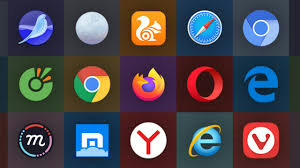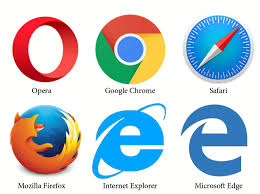Web browsers, such as Google Chrome and Mozilla Firefox, serve as essential tools that allow users to navigate the vast expanse of the internet by entering URLs. On the other hand, search engines like Google and Bing function as specialised software applications designed to locate specific information online through the use of keywords. If you’re curious about how these two differ, delve into the article for a deeper understanding.

What is a browser?
Essentially, it’s a software application that acts as a bridge between your device and web servers. Browsers enable you to access and retrieve various types of content from the internet—be it web pages, images, videos, or other files that you seek. They facilitate navigation between different pages via hyperlinks and often come equipped with built-in search capabilities to help you find information swiftly. Additionally, browsers allow users to save their favourite websites for easy future access through bookmarks. They also incorporate security measures designed to protect against malware and phishing attempts while offering extensions that let users customise their browsing experience according to personal preferences. Among the most widely used browsers are Google Chrome, Mozilla Firefox, Apple Safari, Microsoft Edge, and Opera.

Now, let’s explore what a web search engine is all about. A search engine is an application that empowers individuals to discover information on the World Wide Web by inputting keywords or phrases. It scours the internet based on these criteria and presents results in a format known as search engine results pages (SERPs). Utilising web crawlers and spiders for this task allows search engines to access various content types—web pages, images, or videos—and they rank these results based on factors like relevance to your query, freshness of content, and backlink counts. The most trusted names in this realm include Google, Bing, Yahoo Search, and DuckDuckGo.

The distinction between a search engine and a web browser
Understanding the distinction between a search engine and a web browser is essential for navigating the digital landscape effectively. Let’s delve into their differences to enhance your comprehension.
First, consider their purposes. A web browser serves as your gateway to the World Wide Web, allowing you to access various types of content like websites, images, and videos. In contrast, a search engine acts as a tool that scours the internet based on your queries, delivering results that are most pertinent to what you’re looking for.
Next, think about how we use these tools. Browsers are designed for directly visiting specific websites by entering their URLs. On the other hand, search engines focus on locating information through keywords you provide.
When it comes to installation, there’s another distinction: search engines operate entirely online and do not require any setup on your device. Browsers, however, must be installed as software applications before you can use them.

Accessibility also varies between the two. Search engines can be accessed from any internet-enabled device—be it a computer, tablet, or smartphone—while browsers become available once installed and can be opened via desktop applications across various devices, including tablets and smart TVs.
The components of each tool further highlight their differences. Search engines utilise intricate algorithms to deliver relevant results; they deploy crawlers that scan the web and analyse queries with specialised processors while offering users advanced search options through a dedicated search bar. Conversely, browsers employ rendering engines that convert HTML files along with CSS and JavaScript into visual representations of web pages. They come equipped with features such as address bars for URLs, navigation buttons for moving back and forth between pages, bookmarks for saving favourite sites, and histories of previous searches.
In terms of data management, a search engine maintains an ever-evolving database filled with millions of web pages ready to be indexed for quick retrieval based on user inquiries. Meanwhile, browsers do not contain their repositories of web content; instead, they keep track of browsing data like cookies and cache files alongside your history of visited sites.

Consider also how these tools depend on one another: without an internet connection or a browser to access them through its interface—a necessity for using search engines—you wouldn’t be able to perform searches online at all. However, it’s worth noting that you can browse without needing a search engine; simply typing in known URLs will suffice.
Lastly, let’s touch upon data privacy: When using a search engine like Google or Bing, bits of information about your preferences are collected to refine future searches tailored just for you. This practice raises important questions about privacy in our digital age.
In summary, while both browsers and search engines play crucial roles in our online experiences—the former directs us toward specific content while the latter helps us discover new information—they serve distinct functions within the vast realm of the Internet.

Maxthon versus Google
1. Understanding the Tools: The Google search engine and Maxthon browser serve different purposes in your online experience. Google is primarily a search engine designed to find and organise information across the web. On the other hand, Maxthon is a web browser that allows users to access websites and use various online applications.

2. Search Functionality: When you use Google, its algorithms sift through billions of web pages to deliver relevant search results based on your query. It’s equipped with features like image searching, news aggregation, and map integration for enhanced functionality.
3. Web Browsing Experience: Maxthon provides an environment where you can navigate the web, bookmark pages, and manage tabs efficiently. With its dual rendering engines (Trident and WebKit), Maxthon ensures that websites display correctly as per their design requirements.
4. Customization Options: Maxthon offers extensive customisation options through extensions and skins, allowing users to tailor their browsing experience according to personal preferences. In contrast, while Google has some customisation settings for how results are displayed, it does not offer user interface modifications like a browser does.

5. Speed and Performance: Both tools focus on speed but in different contexts; Google optimises its search speed, while Maxthon aims for fast loading times when accessing various websites.
6. Privacy Features: Privacy settings differ significantly between the two. Maxthon includes built-in ad-blocking features and private browsing modes designed to enhance user privacy during internet sessions. Google collects data from searches, which may impact user privacy but improve the personalised experience.
7. Usage Scenario: Use Google when you want to look up specific information or conduct research effectively with tailored search results. Conversely, launch Maxthon to surf multiple websites seamlessly with added features that facilitate comfortable navigation.
8. Conclusion: Understanding these differences helps users take full advantage of both tools—using Google for intelligent searching while relying on Maxthon for efficient web browsing.
